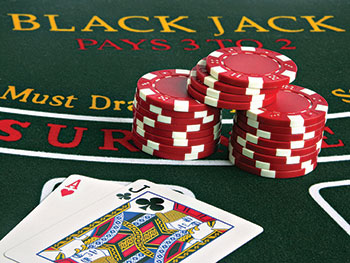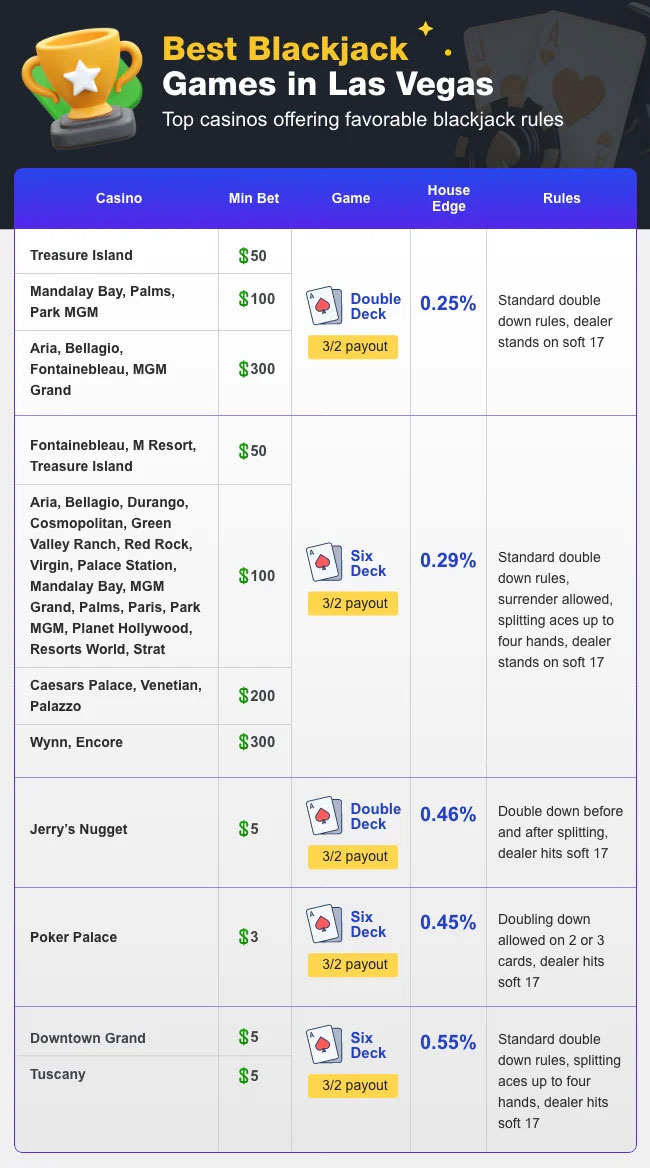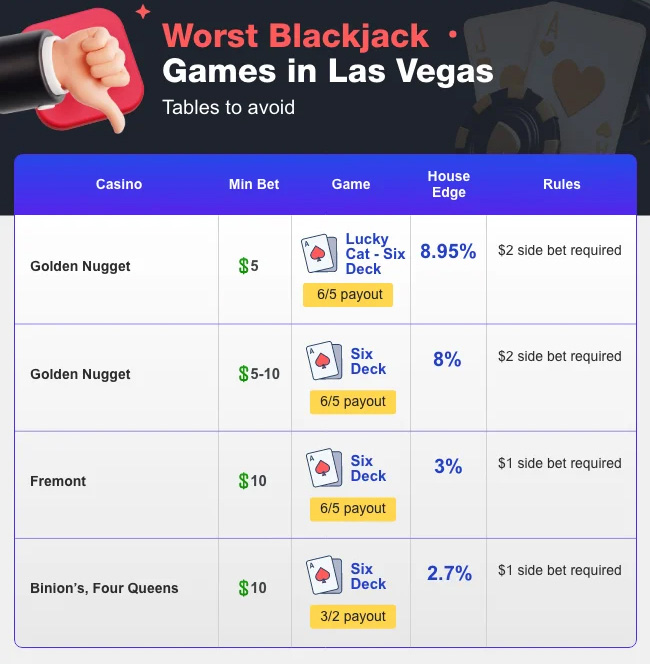The Best and Worst Blackjack Games in Las Vegas
Where to Play, Where to Avoid, and How to Win Big!
By John Mehaffey

Las Vegas holds a special place in every blackjack player’s heart. But finding the right place to place your bets can be overwhelming, especially when every casino offers such a wide range of experiences. This article will help players learn where to play the top blackjack games in Vegas. You’ll find the complete list of the Las Vegas casinos with the best and worst blackjack tables. Make sure to keep these in mind when you are visiting Sin City to make the most of your bankroll and win big!
This article, written by OnlineUnitedStatesCasinos.org, provides players with the most up-to-date and exclusive information on blackjack in Las Vegas. With years of collected data, the site helps players identify the best and worst casinos for blackjack, ensuring they make informed decisions on where to play. Their comprehensive index of blackjack games covers various regions throughout Las Vegas, including the north, central and south Las Vegas Strip, Downtown Las Vegas, and off-the-Strip casinos, offering a valuable resource for both casual and seasoned players.
 Game Rules and House Edge
Game Rules and House Edge
The recommendations are based on the house edge of each game. We also include minimum bet information to help players find the limits in their range.
The data also categorizes blackjack according to rules: single-deck, double-deck, six-deck and eight-deck.
The information shows specific rules and how they affect players. Each blackjack rule affects the house edge, from the number of decks used to the dealer’s decision on a soft 17.
When it comes to bad blackjack rules, the 6/5 blackjack payout is the most common factor. Some casinos offer low-limit blackjack with mandatory side bets, too.
Las Vegas casinos that play it straight make the list of the best blackjack tables. Several have blackjack tables with a 0.30% house edge or lower.
Among the major companies, MGM Resorts and Station Casinos have the best general set of rules.
Best Blackjack Games in Las Vegas
The best blackjack games usually share the same characteristics. These games always pay 3/2. If they pay 6/5, the house edge increases by 1.39%. Great tables usually stand on soft 17. If the dealer hits soft 17, that adds about 0.2% to the house edge.
All good blackjack games permit doubling down on two cards before and after splitting. Six-deck games should allow players to split aces up to three times into four hands.
Players should be able to surrender at these six-deck tables, which means folding the hand before hitting or standing and receiving half the bet back.
Games with identical rules have a higher house edge when more decks are used. For example, a double-deck game with double down before and after splitting has a house advantage of about 0.46%.
When six decks are used, the house holds around 0.64%. That goes up to 0.66% at an eight-deck game.
#1 Vegas Blackjack Game
Available at MGM Resorts, Fontainebleau, Palms and Treasure Island
Sadly, El Cortez removed its single-deck blackjack game in 2024. It was the last that paid 3/2 in Las Vegas. That leaves 3/2 double-deck games that stand on soft 17 as the best in the market.
Those tables are available at Treasure Island for $50, Mandalay Bay, Palms and Park MGM for $100, and $300 or more at Aria, Bellagio, Fontainebleau and MGM Grand.
This game has standard double-down rules and has a house edge of about 0.25%.
#2 Blackjack Game
Available at Most Strip Casinos Plus Durango, Green Valley Ranch, M Resort, Palace Station, Red Rock and Virgin
The second-best Las Vegas blackjack game deals six decks, offers standard double-down rules, surrender, splitting aces up to four hands and the dealer stands on soft 17.
Most Las Vegas Strip casinos offer this game, as well as a few in the locals market. It is not available downtown.
Limits vary by time of day. The numbers below represent the lowest price points available, which are often in the mornings and afternoons.
Fontainebleau, M Resort and Treasure Island are the cheapest casinos with this game. The minimum bet is $50. For $100, players will find it at Aria, Bellagio, Cosmopolitan, Durango, Green Valley Ranch, Mandalay Bay, MGM Grand, Palace Station, Palms, Paris, Park MGM, Planet Hollywood, Red Rock, Resorts World, Strat and Virgin.
It is often $200 at Caesars Palace, Venetian and Palazzo. Wynn and Encore often require $300 or $500 to get this game in its salons.
Best $5 Blackjack Table
Jerry’s Nugget
Jerry’s Nugget offers the last regular $5 3/2 double-deck blackjack game in the Las Vegas market. It is located north of downtown, just inside the North Las Vegas city limits.
We recommend driving there. If you do not have a car, you may need to catch a cab for your return at the clubs across Las Vegas Blvd. from Jerry’s Nugget. Walking there from downtown is not advised.
Players may double down before and after splitting. The dealer hits soft 17. The house edge is 0.46%.
Honorable mention goes to Downtown Grand and Tuscany. These casinos deal $5 six-deck blackjack with normal double-down rules. Players may split aces up to four hands. The dealer hits soft 17.
Downtown Grand is one block north of the Fremont Street Experience. Tuscany is just east of the Las Vegas Strip on Flamingo Road.
North Las Vegas $3 Blackjack Table
Poker Palace
One $3 3/2 blackjack game remains in the Las Vegas market. It is at Poker Palace on Main Street in North Las Vegas. It has a $3 game that permits doubling down on two or three cards before and after a split. The pit is only open during evening hours.

The Worst Blackjack Games in Las Vegas
The worst Las Vegas blackjack games have bad rules that hurt players. Most bad blackjack games pay even money or 6/5. A $10 bet would pay $15 at a 3/2 table. It pays $12 at a 6/5 game and $10 at an even-money one.
Four downtown casinos require a side bet at the worst blackjack tables. It is $2 at Golden Nugget and $1 at Binion’s, Fremont and Four Queens. All four casinos offer better games if you walk past these terrible tables.
Worst Las Vegas Blackjack
Golden Nugget is home to the two worst Las Vegas blackjack games. This Fremont Street Experience casino requires $2 side bets for its $5 and $10 games.
The $5 tables are Lucky Cat Blackjack. In this game, if the dealer makes 22, four unique dice are rolled to determine the outcome. These dice have a lucky cat on one side and are blank on the other five. The player is paid based on the number of lucky cats rolled.
If no lucky cats appear, the player pushes on 22. Players receive even money on one lucky cat, 2/1 on two, 10/1 on three, and 50/1 if all four dice show the lucky cat. Otherwise, the game plays like a normal blackjack table.
A $2 Bonus Spin side bet is required. If the player is dealt a blackjack, a weighted wheel spins to determine the payout. One space on the wheel triggers the progressive jackpot. Golden Nugget’s Lucky Cat Blackjack has a house edge of 8.95% at the minimum $7 bet when including the required side bet.
The second-worst Las Vegas blackjack game is a traditional 6/5 one. It also has a required $2 Bonus Spin side bet. This table is $5 when the Lucky Cat pit is closed. The $7 bet holds approximately $0.56, making the house edge 8%. The game moves to $10+2 when Lucky Cat is open. That holds about 5.5%.
Golden Nugget has two $25 3/2 blackjack tables in the back of the main pit. There are $50 ones in the salon. These tables do not require a side bet.
Other Bad Las Vegas Blackjack Tables
The other worst Las Vegas blackjack games are also on Fremont Street. Fremont has the same $10 game that requires the Bonus Spin side bet. However, it is only $1 more. It has a house edge of 3%. Binion’s and Four Queens have a 3/2 version of this game with a $10 minimum bet. That lowers the house edge slightly to 2.7%.
Play These Games Instead!
Binion’s and Four Queens deal two great variants: One is Double Up; the other is Blackjack Switch. These games have difficult strategies that must be learned to keep the house edge low.
Fremont has 3/2 double-deck blackjack. Double down before and after splitting is permitted.

John Mehaffey serves as the Editor-in-Chief at www.OnlineUnitedStatesCasinos.org, bringing over two decades of experience and respect within the U.S. casino community. Renowned for breaking industry news, John has established himself as a trusted authority on both online and Las Vegas casinos. Since 2001, he has been actively engaging with online gaming for real money while sharing his insights through compelling writing. Based in Las Vegas, John continues to explore and report on the evolving world of online and brick-and-mortar casinos.


